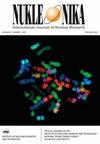Application of genetic algorithms in optimization of SFR nuclear reactor design
IF 0.3
4区 物理与天体物理
Q4 CHEMISTRY, INORGANIC & NUCLEAR
引用次数: 2
Abstract
Abstract This work presents a demonstrational application of genetic algorithms (GAs) to solve sample optimization problems in the generation IV nuclear reactor core design. The new software was developed implementing novel GAs, and it was applied to show their capabilities by presenting an example solution of two selected problems to check whether GAs can be used successfully in reactor engineering as an optimization tool. The 3600 MWth oxide core, which was based on the OECD/NEA sodium-cooled fast reactor (SFR) benchmark, was used a reference design [1]. The first problem was the optimization of the fuel isotopic inventory in terms of minimizing the volume share of long-lived actinides, while maximizing the effective neutron multiplication factor. The second task was the optimization of the boron shield distribution around the reactor core to minimize the sodium void reactivity effect (SVRE). Neutron transport and fuel depletion simulations were performed using Monte Carlo neutron transport code SERPENT2. The simulation resulted in an optimized fuel mixture composition for the selected parameters, which demonstrates the functionality of the algorithm. The results show the efficiency and universality of GAs in multidimensional optimization problems in nuclear engineering.遗传算法在SFR核反应堆优化设计中的应用
摘要本文介绍了遗传算法(GAs)在第四代反应堆堆芯设计中解决样本优化问题的示范应用。新软件的开发是为了实现新的GAs,并通过给出两个选定问题的示例解决方案来验证GAs是否可以成功地用于反应器工程作为优化工具。基于OECD/NEA钠冷快堆(SFR)基准的3600m带氧化物堆芯采用了参考设计[1]。第一个问题是燃料同位素库存的优化,即最小化长寿命锕系元素的体积份额,同时最大化有效中子倍增系数。第二项任务是优化堆芯周围的硼屏蔽分布,以最小化钠空洞反应性效应(SVRE)。利用蒙特卡罗中子输运代码SERPENT2进行中子输运和燃料耗尽模拟。仿真结果表明,在所选参数下得到了优化的混合燃料成分,验证了算法的有效性。结果表明了遗传算法在核工程多维优化问题中的有效性和通用性。
本文章由计算机程序翻译,如有差异,请以英文原文为准。
求助全文
约1分钟内获得全文
求助全文
来源期刊

Nukleonika
物理-无机化学与核化学
CiteScore
2.00
自引率
0.00%
发文量
5
审稿时长
4-8 weeks
期刊介绍:
"Nukleonika" is an international peer-reviewed, scientific journal publishing original top quality papers on fundamental, experimental, applied and theoretical aspects of nuclear sciences.
The fields of research include:
radiochemistry, radiation measurements, application of radionuclides in various branches of science and technology, chemistry of f-block elements, radiation chemistry, radiation physics, activation analysis, nuclear medicine, radiobiology, radiation safety, nuclear industrial electronics, environmental protection, radioactive wastes, nuclear technologies in material and process engineering, radioisotope diagnostic methods of engineering objects, nuclear physics, nuclear reactors and nuclear power, reactor physics, nuclear safety, fuel cycle, reactor calculations, nuclear chemical engineering, nuclear fusion, plasma physics etc.
 求助内容:
求助内容: 应助结果提醒方式:
应助结果提醒方式:


